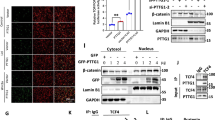Abstract
Increased expression of Pituitary Tumor Transforming Gene 1 (Pttg1) has been shown in various tumor cells, including breast cancer (BC). However, the precise role of Pttg1 in the tumorigenesis is not clarified yet. Here, we examined BC from the patients and detected significant increases and correlation in Pttg1 and phosphorylated SMAD3 (pSMAD3), a key effector of activated transforming growth factor β (TGFβ) receptor signaling pathway. Pttg1 levels were then modulated by transgene or small hairpin RNA (shRNA) in a human BC cell line, BT474, respectively. We found that Pttg1 overexpression increased the proliferation of BC cells in vitro and in vivo, while Pttg1 inhibition decreased proliferation of BC cells in vitro and in vivo. Moreover, phosphorylation of SMAD3 by TGFβ1 was significantly inhibited by Pttg1 overexpression, suggesting that Pttg1 may promote growth of BC cells by inhibiting pSMAD3-mediated cell-growth inhibition. Thus, Pttg1 appears to be a novel therapeutic target for controlling the tumorigenesis of BC.




Similar content being viewed by others
References
Lippman ME. The development of biological therapies for breast cancer. Science. 1993;259(5095):631–2.
Spector NL, Blackwell KL. Understanding the mechanisms behind trastuzumab therapy for human epidermal growth factor receptor 2-positive breast cancer. J Clin Oncol. 2009;27(34):5838–47.
Reedijk M. Notch signaling and breast cancer. Adv Exp Med Biol. 2012;727:241–57.
Sachdev D. Targeting the type I insulin-like growth factor system for breast cancer therapy. Curr Drug Targets. 2010;11(9):1121–32.
Imamura T, Hikita A, Inoue Y. The roles of TGF-beta signaling in carcinogenesis and breast cancer metastasis. Breast Cancer. 2012;19(2):118–24.
Drabsch Y, ten Dijke P. TGF-beta signaling in breast cancer cell invasion and bone metastasis. J Mammary Gland Biol Neoplasia. 2011;16(2):97–108.
Band AM, Laiho M. Crosstalk of TGF-beta and estrogen receptor signaling in breast cancer. J Mammary Gland Biol Neoplasia. 2011;16(2):109–15.
Buck MB, Knabbe C. TGF-beta signaling in breast cancer. Ann N Y Acad Sci. 2006;1089:119–26.
Prosperi JR, Goss KH. A Wnt-ow of opportunity: targeting the Wnt/beta-catenin pathway in breast cancer. Curr Drug Targets. 2010;11(9):1074–88.
Yu R et al. Pituitary tumor transforming gene (PTTG) regulates placental JEG-3 cell division and survival: evidence from live cell imaging. Mol Endocrinol. 2000;14(8):1137–46.
Panguluri SK, Yeakel C, Kakar SS. PTTG: an important target gene for ovarian cancer therapy. J Ovarian Res. 2008;1(1):6.
El-Naggar SM, Malik MT, Kakar SS. Small interfering RNA against PTTG: a novel therapy for ovarian cancer. Int J Oncol. 2007;31(1):137–43.
Chen G et al. Inhibitory effects of anti-sense PTTG on malignant phenotype of human ovarian carcinoma cell line SK-OV-3. J Huazhong Univ Sci Technolog Med Sci. 2004;24(4):369–72.
Zhang J et al. Overexpression of pituitary tumor transforming gene (PTTG) is associated with tumor progression and poor prognosis in patients with esophageal squamous cell carcinoma. Acta Histochem, 2013.
Yan S et al. PTTG overexpression promotes lymph node metastasis in human esophageal squamous cell carcinoma. Cancer Res. 2009;69(8):3283–90.
Zhou C et al. Overexpression of human pituitary tumor transforming gene (hPTTG), is regulated by beta-catenin /TCF pathway in human esophageal squamous cell carcinoma. Int J Cancer. 2005;113(6):891–8.
Shibata Y et al. Expression of PTTG (pituitary tumor transforming gene) in esophageal cancer. Jpn J Clin Oncol. 2002;32(7):233–7.
Zhang ML, Lu S, Zheng SS. Epigenetic changes of pituitary tumor-derived transforming gene 1 in pancreatic cancer. Hepatobiliary Pancreat Dis Int. 2008;7(3):313–7.
Ai J et al. Identification of over-expressed genes in human renal cell carcinoma by combining suppression subtractive hybridization and cDNA library array. Sci China C Life Sci. 2004;47(2):148–57.
Dominguez A et al. hpttg, a human homologue of rat pttg, is overexpressed in hematopoietic neoplasms. Evidence for a transcriptional activation function of hPTTG. Oncogene. 1998;17(17):2187–93.
Zhou C et al. PTTG acts as a STAT3 target gene for colorectal cancer cell growth and motility. Oncogene. 2014;33(7):851–61.
Kim DS et al. Securin induces genetic instability in colorectal cancer by inhibiting double-stranded DNA repair activity. Carcinogenesis. 2007;28(3):749–59.
Huang SQ et al. RNAi-mediated knockdown of pituitary tumor- transforming gene-1 (PTTG1) suppresses the proliferation and invasive potential of PC3 human prostate cancer cells. Braz J Med Biol Res. 2012;45(11):995–1001.
Huang S et al. PTTG1 inhibits SMAD3 in prostate cancer cells to promote their proliferation. Tumour Biol. 2014;35(7):6265–70.
Ghayad SE et al. Identification of TACC1, NOV, and PTTG1 as new candidate genes associated with endocrine therapy resistance in breast cancer. J Mol Endocrinol. 2009;42(2):87–103.
Chen CC et al. Combination of multiple mRNA markers (PTTG1, Survivin, UbcH10 and TK1) in the diagnosis of Taiwanese patients with breast cancer by membrane array. Oncology. 2006;70(6):438–46.
Massague J. TGFbeta in cancer. Cell. 2008;134(2):215–30.
Xiao X et al. M2 macrophages promote beta-cell proliferation by up-regulation of SMAD7. Proc Natl Acad Sci U S A. 2014;111(13):E1211–20.
Yi JJ et al. TGF-beta signaling specifies axons during brain development. Cell. 2010;142(1):144–57.
Ewen ME et al. TGF beta inhibition of Cdk4 synthesis is linked to cell cycle arrest. Cell. 1993;74(6):1009–20.
Naka K et al. TGF-beta-FOXO signalling maintains leukaemia-initiating cells in chronic myeloid leukaemia. Nature. 2010;463(7281):676–80.
Xiao X et al. TGFβ receptor signaling is essential for inflammation-induced but not β-cell workload-induced beta-cell proliferation. Diabetes. 2013;62(4):1217–26.
Rajamannan NM et al. TGFβ inducible early gene-1 (TIEG1) and cardiac hypertrophy: Discovery and characterization of a novel signaling pathway. J Cell Biochem. 2007;100(2):315–25.
Lasfargues EY, Coutinho WG, Redfield ES. Isolation of two human tumor epithelial cell lines from solid breast carcinomas. J Natl Cancer Inst. 1978;61(4):967–78.
Conflicts of interest
None
Author information
Authors and Affiliations
Corresponding authors
Additional information
Guofeng Zhang and Qicheng Zhao equally contributed to this work.
The Publisher and Editor retract this article in accordance with the recommendations of the Committee on Publication Ethics (COPE). After a thorough investigation we have strong reason to believe that the peer review process was compromised.
An erratum to this article is available at http://dx.doi.org/10.1007/s13277-017-5487-6.
About this article
Cite this article
Zhang, G., Zhao, Q., Yu, S. et al. RETRACTED ARTICLE: Pttg1 inhibits TGFβ signaling in breast cancer cells to promote their growth. Tumor Biol. 36, 199–203 (2015). https://doi.org/10.1007/s13277-014-2609-2
Received:
Accepted:
Published:
Issue Date:
DOI: https://doi.org/10.1007/s13277-014-2609-2




